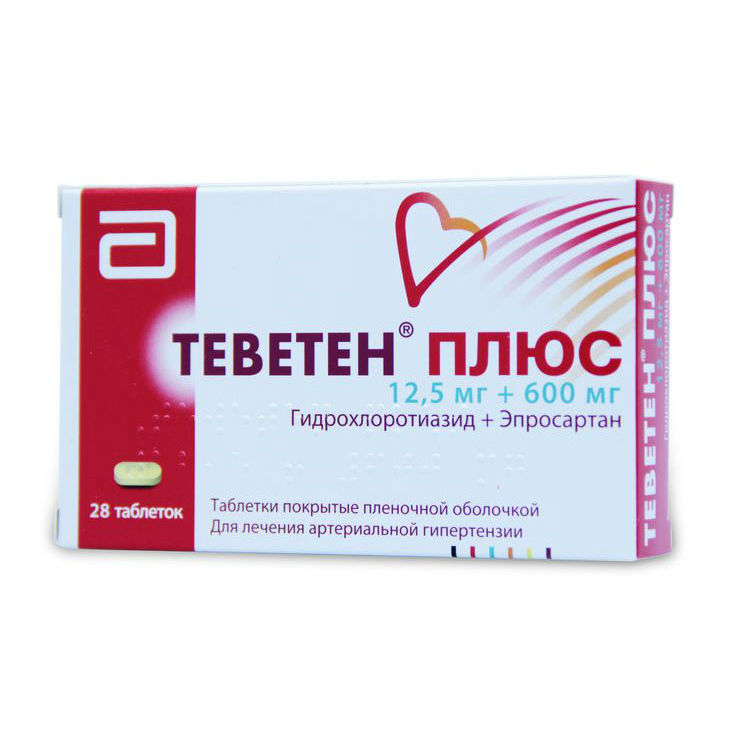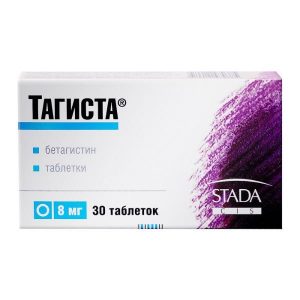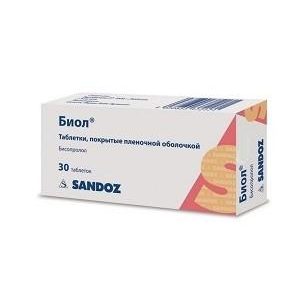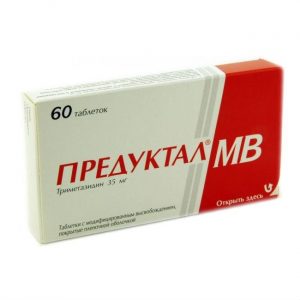Description
Release form
film-coated tablets.
Packing
28 pcs.
Pharmacological action of
Eprosartan
Angiotensin II receptor antagonist, selectively acts on ATI receptors located in the vessels, heart, kidneys and adrenal cortex, forms a strong bond with them with subsequent slow dissociation.
Prevents the development or weakens the effects of angiotensin II, inhibits the activity of the renin-angiotensin-aldosterone system (RAAS). It has a vasodilating, hypotensive and indirect diuretic effect.
Reduces arterial vasoconstriction, total peripheral vascular resistance (OPSS), circulatory pressure, reabsorption of water and sodium in the proximal renal tubule, and aldosterone secretion. With prolonged use, it inhibits the proliferative effect of angiotensin II on vascular and myocardial smooth muscle cells.
Antihypertensive effect after taking a single dose inside develops within 24 hours, and a stable therapeutic effect develops with regular ingestion – after 2-3 weeks without affecting the heart rate (heart rate). Does not cause the development of orthostatic hypotension in response to the first dose of the drug.
Increases renal blood flow and glomerular filtration rate, reduces the excretion of albumin (nephroprotective effect), while maintaining renal self-regulation, regardless of the severity of renal failure. It does not affect lipid, carbohydrate and purine metabolism. Upon termination of treatment does not cause withdrawal syndrome.
Less commonly than angiotensin converting enzyme (ACE) inhibitors, it causes effects associated with bradykinin activity (including dry, persistent cough).
Hydrochlorothiazide
Hydrochlorothiazide is a thiazide diuretic. Thiazides act on the mechanisms of reabsorption of electrolytes in the renal tubule, increasing the volume of excretion of liquid, sodium and chlorine.
Due to the diuretic effect of hydrochlorothiazide, plasma volume decreases, plasma renin activity increases, aldosterone secretion increases, which leads to increased excretion of potassium and bicarbonate by the kidneys and a decrease in serum potassium. The mechanism of the hypotensive effect of hydrochlorothiazide is a combined diuretic and vasodilating effect.
Teveten ® plus
In patients with high systolic blood pressure (BP), eprosartan provides a statistically significant decrease in blood pressure. Addition to a single daily dose (600 or 1200 mg) of eprosartan 12, 5 mg of hydrochlorothiazide provides an additional statistically significant decrease in systolic blood pressure compared with the daily intake of eprosartan alone.
Combined use of eprosartan with hydrochlorothiazide reduces the potassium loss associated with the diuretic effect of hydrochlorothiazide. The diuretic effect of Teveten plus develops during the first 2 hours, and reaches a maximum – 4 hours after ingestion.
A stable hypotensive effect develops, usually after 2-3 weeks of treatment.
Pharmacokinetics
Eprosartan
When administered, the absolute bioavailability is about 13%. The maximum concentration (Cmax) in blood plasma is determined after 1-2 hours. Communication with plasma proteins is high (98%) and remains constant after reaching a therapeutic concentration in blood plasma. The degree of binding to blood plasma proteins does not depend on the gender, age, and liver function of patients and does not change with moderate or slightly pronounced renal failure, but may decrease in severe renal failure.
Practically does not cumulate.
Distribution volume is 13 l, total clearance – 130 ml / min. When taken orally, it is excreted mainly unchanged – through the intestines (90%), by the kidneys (7%). A small part (less than 2%) is excreted by the kidneys in the form of glucuronides. In elderly patients, the values of Cmax and the area under the concentration-time curve (AUC) increase, on average, by 2 times, which, however, does not require dose adjustment, since it has no clinical value.
With liver failure, AUC values increase, on average, by about 40%, which does not require dose adjustment and has no clinical significance.
In patients with moderate chronic renal failure (CRF) (creatinine clearance (CC) from 30 to 59 ml / min.) AUC and Cmax by 30%, and with severe CRF (CC from 5 to 29 ml / min.) – 50% higher compared to healthy volunteers. The pharmacokinetics of eprosartan is not different in male and female patients.
Hydrochlorothiazide
Hydrochlorothiazide is not metabolized, it is rapidly excreted by the kidneys. At least 61% of the dose taken orally is excreted unchanged within 24 hours. It does not cross the blood-brain barrier, but crosses the placental barrier and is excreted in breast milk.
Teveten plus
Concomitant use of eprosartan and hydrochlorothiazide does not have a clinically significant effect on the pharmacokinetics of both components. Eating does not affect the bioavailability of eprosartan and hydrochlorothiazide, but delays their absorption. Maximum plasma concentrations are reached 4 hours after taking eprosartan and 3 hours after taking hydrochlorothiazide by mouth.
Contraindications
Hypersensitivity to eprosartan, hydrochlorothiazide and other sulfanilamide derivatives and other components of the drug.
Pregnancy and lactation.
Severe renal failure (CC less than 30 ml / min).
Age under 18 years (efficacy and safety not established).
Hemodynamically significant bilateral renal artery stenosis and single kidney artery stenosis.
Rare hereditary galactose intolerance, lactase deficiency or glucose-galactose absorption deficiency syndrome (the drug contains lactose).
Precautions
Severe chronic heart failure (NYHA class IV functional class) bilateral renal artery stenosis, single kidney artery stenosis, decreased circulating blood volume (BCC), violation of the water-electrolyte balance of the blood (due to the use of large doses of diuretics, repeated vomiting, prolonged diarrhea, salt-free diet), moderate or severe impaired liver function, diabetes mellitus.
There is no clinical experience with Teveten ® plus in the treatment of patients with severe hepatic impairment.
Special instructions
Based on the pharmacodynamic properties, Teveten Plus should not affect the ability to drive a car and use machines and mechanisms. During the treatment of hypertension, care must be taken when driving vehicles and engaging in potentially dangerous activities that require an increased concentration of attention and speed of psychomotor reactions, due to the fact that dizziness and weakness can occur.
Composition
1 film-coated tablet contains:
Active substances: eprosartan mesylate – 735.8 mg, which corresponds to 600 mg of eprosartan, hydrochlorothiazide – 12.5 mg.
Excipients: microcrystalline cellulose – 43.3 mg, lactose monohydrate – 43.3 mg, pregelatinized corn starch – 43.3 mg, crospovidone – 38.5 mg, magnesium stearate – 7.2 mg, purified water – 50.9 mg
Shell: Opadry II Butterscotch 85F27320 – 39 mg (polyvinyl alcohol – 15.60 mg, macrogol 3350 – 7.88 mg, talc – 5.77 mg, titanium dioxide (E171) – 9.41 mg, yellow iron oxide (E172 ) – 0.33 mg, black iron oxide (E172) – 0.004 mg).
Dosage and administration of
Teveten Plus is taken orally, 1 tablet. per day, in the morning, regardless of food intake.
Teveten Plus dose selection in elderly patients, patients with mild to moderate impaired liver function, as well as patients with impaired renal function (creatinine Cl more than 30 ml / min) is not required.
Side effects
The overall incidence of side effects reported in patients taking eprosartan is comparable to that for placebo. These actions, as a rule, were mild and short-lived, so only 4.1% of patients taking eprosartan during placebo-controlled clinical trials required termination of treatment (6.5% in the placebo group).
From the side of the central nervous system: rarely – headache, dizziness, asthenia.
From the cardiovascular system: very rarely – a decrease in blood pressure, incl. postural hypotension.
From the skin and subcutaneous fat: rarely – skin reactions (rash, itching and urticaria) very rarely – facial swelling, angioedema.
Other: rarely – cough.
Drug Interactions
The antihypertensive effect may be enhanced while it is used with other antihypertensive agents.
When used in conjunction with oral hypoglycemic agents, it is necessary to adjust their dose, because hydrochlorothiazide may decrease glucose tolerance.
With simultaneous use with lithium preparations, a reversible increase in the concentration of lithium in the blood plasma and an increase in the risk of its toxic effects are possible (careful monitoring of the concentration of lithium in patients receiving this combination is necessary).
NSAIDs may decrease the diuretic and antihypertensive effect of Teveten Plus.
By lowering potassium levels, hydrochlorothiazide can enhance the action of cardiac glycosides and certain antiarrhythmic drugs.
Hydrochlorothiazide increases the risk of hypokalemia when prescribed together with drugs that cause the body to lose potassium, for example, diuretics with a potassium-euretic effect, laxatives, GCS and ACTH.
Hydrochlorothiazide may enhance the effects of non-depolarizing muscle relaxants (e.g. tubocurarine). The absorption of hydrochlorothiazide is reduced with the combined use of anion exchange resins (e.g., colestyramine or colestipol).
Overdose
There are no data on overdose of Teveten plus. Among the symptoms, it is possible to assume the following: an excessive decrease in blood pressure, dehydration and electrolyte imbalance (hypokalemia, hypochloremia, hyponatremia), manifested in the form of nausea and drowsiness.
Treatment, depending on the time elapsed after a meal, measures taken should include stimulation of vomiting, gastric lavage and / or intake of activated charcoal.
With a sharp decrease in blood pressure, it is recommended to lay the patient on his back, raise his legs, and, if necessary, introduce plasma-replacement fluids. With dehydration and impaired salt-water balance, symptomatic and supportive therapy is recommended. Hemodialysis is not effective.
Storage conditions
The product should be stored in a dry place at a temperature not exceeding 25 ° C.
Expiration
3 years.
active substance
Eprosartan
conditions granted through pharmacies
By prescription
lekarstvennaja form
tablets




